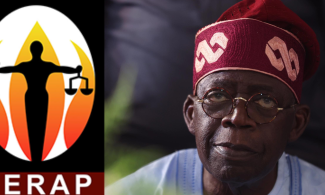
SERAP asked the President to "set up a presidential panel of enquiry to promptly probe the grim allegations that US$2.1 billion and N3.1 trillion public funds of oil revenues and budgeted as fuel subsidy payments are missing and unaccounted for between 2016 and 2019, as documented by the Auditor-General of the Federation."
The Socio-Economic Rights and Accountability Project (SERAP) has urged President Bola Tinubu to probe allegations of oil revenue funds.
SERAP asked the President to "set up a presidential panel of enquiry to promptly probe the grim allegations that US$2.1 billion and N3.1 trillion public funds of oil revenues and budgeted as fuel subsidy payments are missing and unaccounted for between 2016 and 2019, as documented by the Auditor-General of the Federation."
The organisation urged him to "name and shame anyone suspected to be responsible for the alleged widespread and systemic corruption in the use of oil revenues and the management of public funds budgeted as fuel subsidy and to ensure their effective prosecution as well as the full recovery of any proceeds of crime."
It also urged him "to promptly, thoroughly, independently, transparently and effectively probe all fuel subsidy paid by successive governments since the return of democracy in 1999, and to use any recovered proceeds of crime as palliatives to address the impact of any subsidy removal on poor Nigerians."
In the letter dated June 3, 2023 and signed by SERAP deputy director Kolawole Oluwadare, the organisation said: "There is a legitimate public interest in ensuring justice and accountability for these serious allegations. There will be no economic growth or sustainability without accountability for these human rights crimes.
"Your government should urgently act to follow due process of law in any policy to remove fuel subsidy, ensure that suspected perpetrators of these crimes against Nigerians are brought to justice and full recovery of any missing public funds."
SERAP noted that removing fuel subsidy arbitrarily “without addressing outstanding accountability issues in the alleged mismanagement of oil revenues and fuel subsidy payments would amount to punishing poverty and further impoverishing the poor while letting high-profile officials and non-state actors get away with their crimes."
The letter read in part: "Any removal of fuel subsidy should not be used as a ploy to keep the poor in poverty while those who allegedly stole oil revenues and fuel subsidy payments keep their ill-gotten wealth.
"Allegations of corruption in oil revenues and fuel subsidy payments suggest that the poor have rarely benefited from the use and management of the revenues and payments."
It further said, "According to the audited reports between 2016 and 2019 by the Auditor General of the Federation (AGF), the Nigerian National Petroleum Corporation (NNPC) failed to remit N663,896,567,227.58 into the Federation Account. The Auditor-General fears that the money may be missing.
"The NNPC also reportedly failed to account for the allocation of crude oil to refineries in 2019. 107,239,436.00 barrels of crude oil were lifted as domestic crude without any document. The Auditor-General fears that the crude valued at N55,891,009,960.63 may have been diverted.
"The NNPC in 2019 also failed to remit N1,955,354,671,268.66 and N55,157,702,848.74 of generated revenues into the Federation Account, contrary to Section 162(1) of the Nigerian Constitution 1999 [as amended]. The Auditor-General fears that the money may have been diverted.
"The NNPC also failed to account for N4,572,844,962.25 of 'domestic gas receipts', thereby 'reducing the distributable revenue in the Federation account.' The Auditor-General wants the money remitted.
"The NNPC also in 2019 failed to account for 22,929.84 litres of PMS pumped from refineries and valued at N7,056,137,180.00. The Auditor-General fears that the PMS may have been diverted.
"The NNPC also 'illegally classified' 239,800 barrels of crude oil valued at N5,498,045,220 as 'crude oil losses.' The Auditor-General fears that the crude oil may have been diverted.
"The Department of Petroleum Resources (DPR) in 2019 also reportedly failed to remit US$1,278,364,595.49 in revenue to the Federation Account. The money was deducted by the NNPC from the Oil and Gas Royalty assessed by the DPR.
"The DPR in 2019 also deducted N19,840,081.29 as 'stamp duty' payments from contractors and consultants but the DPR instantly paid back the money to the contractors and consultants instead of remitting it to the treasury.
"The DPR in 2019 also paid N137,225,973.35 to contractors and consultants for various contracts and consultancies but failed to deduct stamp duty. The Auditor-General wants the money recovered.
"The DPR also paid N11,856,088,271.92 as salaries for 2019 but failed to deduct N118,560,882.72 as contribution of 1% Industrial Training Fund (ITF). The DPR in 2019 also failed to transfer US$35,738,342.95 year balance. The Auditor-General wants the money recovered and remitted.
"The DPR in 2018 also withdrew without any explanation US$759,387,755.10 from DPR Signature Bonus Account rather than paid the money into the Federation Account.
"Subsidy records show that N443,940,559,974.80 was paid as total subsidy for 2016 but the money was not budgeted for. The payments were for outstanding Petroleum Support Fund (PSF) commitments for year 2015.
"However, there was no payment in 2016. Only outstanding payments for previous years 2014 and 2015 and interest payments were made in 2016."
"The Auditor-General fears that the oil marketers that received the subsidy payments may not have been 'eligible to draw from the Petroleum Support Fund as the Petroleum Products Pricing and Regulatory Authority (PPPRA) failed to provide any document on the payments.'
"N39,141,210,181.74 was also paid from the Federation Account in 2016 to different Oil Marketers in 26 transactions, being Payments of Interest and Foreign Exchange Differential on Subsidy but without any document.
"The NNPC also made 'zero profit' and recorded 'losses from its joint ventures in 2016. This is contrary to expectations that profits should be made from the joint ventures.'"